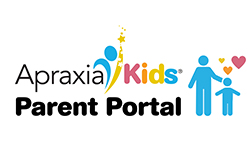Parents should be reassured that speech difficulties are not caused by common parental worries such as sending them to day-care or alcohol consumption during pregnancy. Children do not have CAS because of a parental separation or because the family moved to a new city. While parents have a strong role in healthy child development, current knowledge shows that CAS is caused by:
- Genetic causes – Around a third of children will have a genetic basis for CAS. This includes different complex disorders that can have CAS as a secondary characteristic, but that does not mean that all children with that disorder has CAS. For further information, please see Genetic Testing and Childhood Apraxia of Speech
- Neurological impairment may be caused by infection, illness, seizures or injury, before, during or after birth. This category includes children with positive findings on MRIs (scans) of the brain, including childhood stroke, epilepsy or other forms of brain injury. Although CAS after traumatic brain injury or childhood brain tumour is rare. A more common motor speech disorder following these forms of acquired brain injury is dysarthria [Morgan et al., 2013; Mei et al., 2018]. Some genetic conditions can also cause associated neurological impairment.
- Idiopathic speech disorder (a disorder of “unknown” origin). Children with idiopathic CAS do not have observable neurological abnormalities or easily detected genetic conditions. Most children with CAS still fall under this category, which is often challenging for parents because there is no known cause.
Some speculate that CAS and other childhood conditions may be a result, in part, of environmental conditions (such as nutritional deficits or exposure to toxins). To date, there is no research evidence to support these claims.
Appropriate speech therapy, tailored to the difficulty of speech motor planning and provided frequently, is the single most important opportunity for children with CAS to improve their speech capacity.
By Professor Angela Morgan Ph.D., BSpPath (Aud Hons), and Mariana Lauretta MSpPath, BBiomed, Murdoch Children’s Research Institute & University of Melbourne, Melbourne, Australia with original contributions by Heidi Feldman, M.D., Ph.D.
Updated 2021
